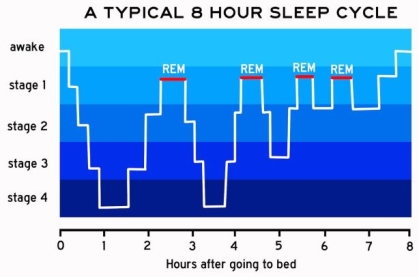How to Eat and Sleep Before Exams
When it comes to college, we often have exams every few weeks. An important thing to remember is your overall health and the quality of your preparation for the exam. This article will detail some things to do in order to help your academic life and to keep you healthy while you are in college.
Eating Habits
- Be mindful of eating balanced meals with the nutrients you need in your diet.
- Eat carbohydrates before an exam. Your brain functions best on glucose and this is an easy way to get glucose into your system.
Sleeping Habits
- Most young adults need seven to nine hours of sleep per night to function at their best.
- See below for a diagram of the average person's sleep cycle.

STAGE 1: This stage involves light sleep when someone can be easily woken.
STAGE 2: The brain begins to produce sleep spindles (a type of brain activity) and this is a deeper sleep than stage one.
STAGES 3 AND 4: This is when your body makes repairs, your muscles relax and you become less responsive to outside stimuli.
REM SLEEP: You generally enter your first REM sleep cycle 90 minutes after you fall asleep. This cycle is most important for your academic life. This is when your body processes information to be stored in your long term memory and plays the biggest role in learning and memory function.
How to Prepare
For any large exam (midterm, final, etc.) it is best to prepare for at least 5 to 7 days. Meet with an academic coach at the Learning Centers for help in structuring your study time.
Different types of material require different approaches to studying.
Lots of dense Information
- Predict essay questions
- Study with a group
- Concept map
- Summarize material in your own words
- Make diagrams
Problem-based
- Make formula cards
- Use annotated problem solving
- Make and take a self test
- Answer chapter questions
- Do problems
- List steps in a process
Not conceptually challenging material
- Make flashcards
- Use quizlet
- Make a study sheet
- Summarize material in your own words
- Outline
- Remark text material
Accordion Content
-
“How Much Sleep Do You Need?: Everyday Health.” EverydayHealth.com, 25 Jan. 2018.


